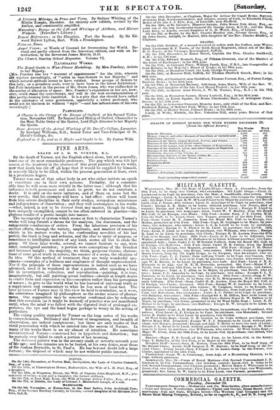FINE. ARTS.
DEATH' OP J. M. W. TURNER, R. A.
By the death of Turner, not the English school alone, but art generally, loses one of its most remarkable professors. The gap which was felt last season at the Academy in the absence of this great painter from its walls, now that death has cut off all hope that it would be supplied by himself, is scarcely likely to bo filled, within the present generation at least, even in a proximate degree. Turner was one of that select body in art who either initiate an epoch or constitute one in their own persons. Probably, for a consider- able time he will seem more strictly in the latter case ; although that his influence is both permanent and made to grow, we do not entertain a doubt It is only on the mere imitators, and of them on none but the very servile, that his example will have a bad effect : others will learn Eons him severe discipline in their early studies, scrupulous minuteness and independence of observation ; and they will contemplate in his works -what, indeed, is not to be learned from any master, though its value, here uniquely exemplified, cannot be thee often, enforced in practice-the glorious results of a poetic insight into nature. The incongruity of system which seems at first to characterize Turner's marks will long furniska theme for the emalysis„ the discussion,. and the antagonistic conclusions of critic& From the laborious precision of his tidiest efforts, through the variety, amplitude, and mastery of resource, visible in his mature works, to the conibunding novelties of his last period, the track is long and arduous, and the clue to unity of purpose, or sometimes to intelligible motive of any kind, seems all but to elude the grasp. Of these later works, several, we cannot hesitate to say, were utter, unmitigated mistakes; a portion were conceptions of the broadest and, intensest insight ; the majority, we think,. gorgeous visions, abstrac- tions of some great truth in nature, the essence of a scene, the idealism of its idea. Of this method of treatment they are truly wonderful spe- cimens-examples of a boldness and singleness of thought unprecedented. Nor if the principle of these representations is indeed such as we have advanced, need it be wondered at that a painter, after spending a long life in investigation, collection, and reproduction-painting, it is true, imaginatively, but still painting actual realities-should at length desire to confer form and expression on his conception rather than his perception of nature ; to give to the world what he has learned of universal truth as seaupplement and commentary to what he has seen of local fact. The later pictures of Turner may in this view be held to symbolize, as it were, lise-sabetratum imagined by philosophers as the arcane source of pheeno- menu. Our supposition may be somewhat confirmed also by reflecting that this revulsion (as it might be deemed) of practice was not manifested
when the mind was fullest with the digested fruit of prolonged ex- perience, the eye and the hand began perhaps to weary in the noting of particulars.
The ruling quality stamped by Turner on the. long series of his works is comprehension- Brilliancy and fervour of imagination, and breadth of observation, are indeed conspicuous ; but these are only modes of that vivid penetration with which he entered into the secrets of Nature. In many of his works there is an air almost of intuition. He sometimes misunderstood Nature-construed her in hyperbole and distortion ; but he scarcely over failed to catch a portion of her meaning. The deceased painter wee in the.aeventy-sixth or seventy-seventh year of his age ; and his remains are to be buried, at his own desire, next those of Sir Joshua Reynolds, in St. Paul's. He has beyond doubt left a large fortune ; the disposal of which may be not without public interest.


























 Previous page
Previous page